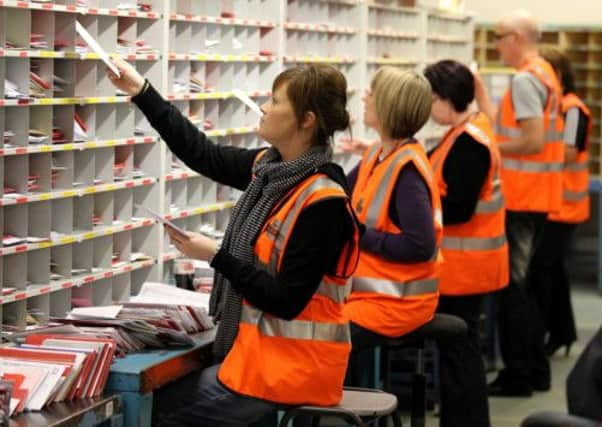Royal Mail: Ministers accused of shares ‘bribe’


Business Secretary Vince Cable said up to 10 per cent of the new company would be gifted to about 150,000 postmen, postwomen and other employees under the £3 billion sell-off, which will begin by the end of the financial year.
Putting the firm on a more commercial footing was crucial to secure its universal, six-days-a-week service, he insisted.
Advertisement
Hide AdAdvertisement
Hide AdBut the Communication Workers Union (CWU) said its members were “too long in the tooth” to be swayed by windfalls, and promised to fight the proposals.
Labour also accused the coalition of selling the organisation “on the cheap” in a desperate bid to make up for Chancellor George Osborne’s failing economic strategy.
In his statement to the Commons, Mr Cable said the government would sell off a majority stake in the business – expected to be 51 per cent initially.
Employees who want to buy more shares on top of their free allocation will get priority, and the rest will be available to the general public as well as institutional investors under the terms of the stock market flotation.
Mr Cable said: “This is logical. It is a commercial decision designed to put Royal Mail’s future on to a long-term, sustainable basis.
“It is consistent with developments elsewhere in Europe, where privatised operators in Austria, Germany and Belgium produce profit margins far higher than the Royal Mail, but have continued to provide high-quality and expanding services.
“Now the time has come for government to step back from Royal Mail and allow its management to focus wholeheartedly on growing the business.
“It’s now time for employees to hold a stake in the company and share in its success.
Advertisement
Hide AdAdvertisement
Hide Ad“This government will give Royal Mail the real commercial freedom it’s needed for a long time.”
The company will be listed on the London Stock Exchange by the end of the financial year, he added.
Mr Cable justified the issue of free shares as a recognition that many staff “would otherwise find them unaffordable”.
However, the CWU – which staged a protest outside Royal Mail’s London headquarters yesterday – dismissed his arguments. Deputy general secretary Dave Ward said: “I don’t think our members will be bought off by the free share issue. I believe our members are too long in the tooth not to know the dangers of privatisation.”
Mr Ward said it was “simply not true” that Royal Mail could not survive without being privatised. “I really do not understand what the government are trying to achieve,” he said.
“If you think about the profits the Royal Mail are now making, there’s no need for it to be privatised.
“What privatisation will do is destroy the UK’s universal postal service. There’s no way private companies can maintain six-day-a-week deliveries to every single address in the UK.”
Mr Ward said he expected members to be balloted by the end of September on whether to take strike action.
Advertisement
Hide AdAdvertisement
Hide AdLabour’s Chuka Umunna told MPs the government had failed to provide any justification for acting now.
“Having nationalised the organisation’s debts by taking on its pension liabilities, they now want to privatise the profit at the very time it is making money. How on earth does that make any sense?” he said.
“There is every sign this treasured national institution is being sold off on the cheap to get income quickly to a Treasury whose economic strategy has failed.”
Universal postal service ‘impossible in an independent Scotland without UK subsidy’
THE SNP was challenged yesterday over how it would pay for the universal postal service in an independent Scotland without cross-Border subsidy from England.
In a Westminster Hall debate called by Labour’s Scottish affairs select committee chairman Ian Davidson, concerns were raised over how the postal service could be maintained should Scotland back independence.
Echoing a recent report by the Department for Business, Innovation and Skills, Mr Davidson pointed out that the more rural geography of Scotland meant its post office network needed subsidies from profitable areas in England.
He said: “My understanding is that the SNP has also indicated there would be one price throughout Scotland, but it has not specified whether that would be the same price that applies in the rest of the United Kingdom, and I think it would be helpful if the SNP did specify that at some point.
Advertisement
Hide AdAdvertisement
Hide Ad“Operating a national service involves cross-subsidy for rural areas, of which Scotland has a disproportionate number.”
SNP postal services spokesman Mike Weir said: “The assets of the mail services – the pillar boxes, the sorting offices and equipment, the vehicles and, above all, the hard-working staff of Royal Mail – will still be in place and will continue, whatever the ownership structure.”
DAVID MADDOX